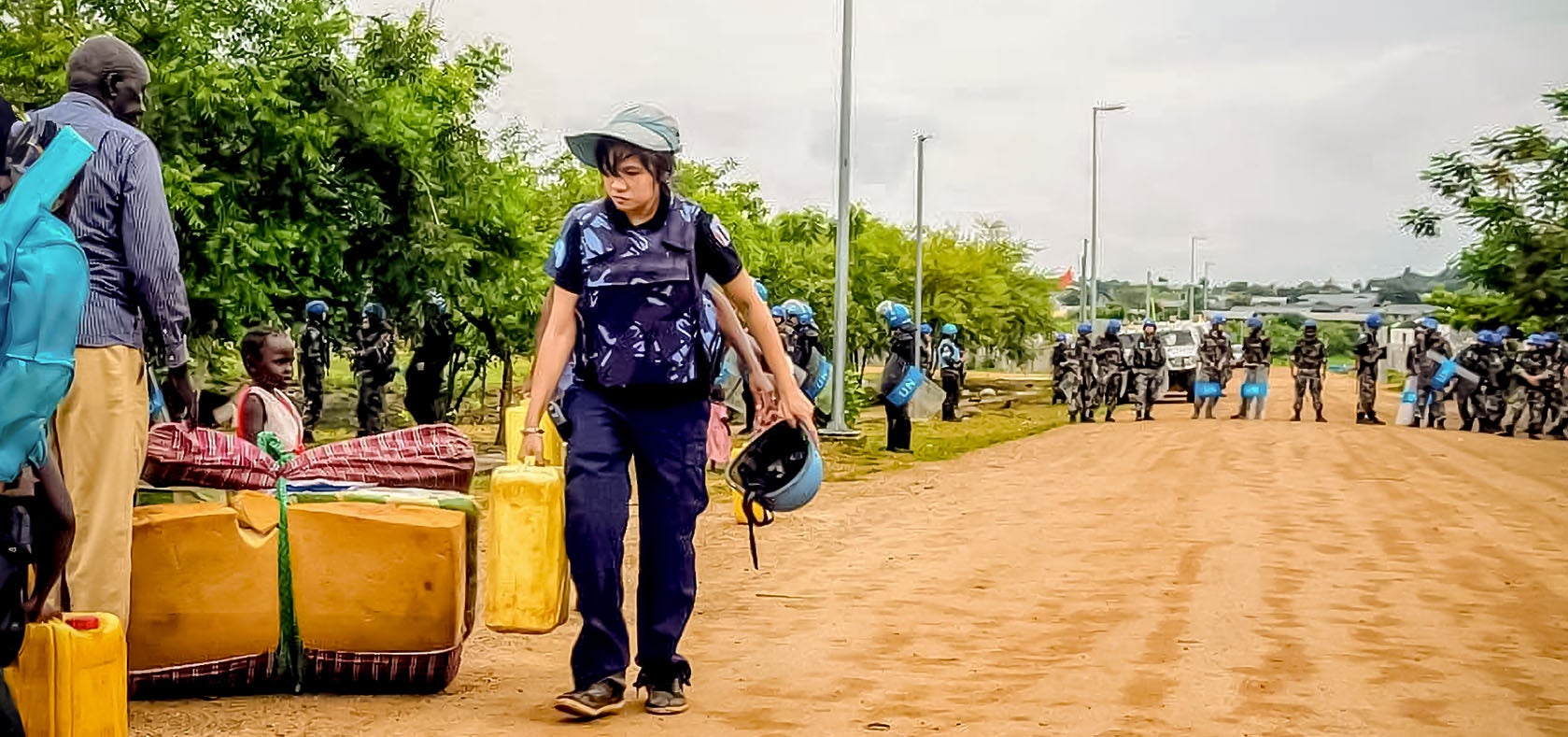From where I stand: “I've seen firsthand the impact that women peacekeepers can have on the ground”
Date:

Liutenant Colonel Peabprom Mekhiyanont is Deputy Superintendent of Cyber Crimes against Children at the Royal Thai Police in Bangkok. There, she led the creation of an artificial intelligence (AI)—powered chatbot to support survivors of domestic violence to access justice. Since 2010, she has served as a UN Peacekeeper in Haiti, South Sudan and currently in Iraq. She has a master’s degree in International Law from the University of Turin in Italy. On International Day of UN Peacekeepers (29 May) she spoke to UN Women about her journey and her motivation to serve communities in her country and around the world.

The main reason I chose to become a police officer comes from the fact that police work involves interacting with people in various situations on a daily basis. Ideally, people trust and depend on the police for their safety and security.
As a woman, I faced the question of whether I'd be adequately supported. Thankfully, I've had a supervisor who consistently encourages my development and career advancement.
Luckily, back home in Thailand, I received comprehensive training in conducting investigations, specifically focusing on addressing sexual crimes against women, from various organizations, including UN Women. The training emphasized the use of forensic interview techniques, with a strong emphasis on gender sensitivity and implementing a victim-centered approach. I also underwent mandatory training on gender sensitivity and equality as part of my participation in a UN mission. The trainings helped me to understand the importance of promoting gender equality, addressing issues such as inequities and discrimination based on gender, and promoting a more inclusive and equal society for all individuals.
My first experience as a UN Peacekeeper was in Haiti, and began in January 2010, in the aftermath of the devastating earthquake. I was deeply saddened when I heard the news and felt I had to find a way to help them. It was during the time that the United Nations requested member States to provide police personnel to support the mission in Haiti. Despite my limited knowledge of peacekeeping operations, I decided to join the mission.
My second mission, which took place from 2015 to 2016, was in South Sudan where I served as a UNPOL officer in the community policing unit, holding the specific role of a "Sensitization Officer." In this capacity, my primary objective was to conduct trainings for local police officers aimed at deepening their understanding of human rights principles and the importance of addressing sexual and gender-based violence (SGBV). Through these trainings, I sought to empower local police officers to better serve their communities
Currently, I am on assignment with UN Peacekeeping as part of the United Nations Investigative Team to Promote Accountability for Crimes Committed by Da'esh/ISIL (Islamic State in Iraq and the Levant) (UNITAD). In my role as an investigator, I support national and international efforts to hold ISIL members accountable for their crimes. My primary tasks involve gathering evidence related to war crimes, crimes against humanity, and genocide committed by ISIL in Iraq between 2014-2017. This work is similar to police work in my home country, but we must adhere to International Humanitarian Law (IHL).
The main challenge I have encountered as a UN peacekeeper has been the language barrier which becomes particularly challenging in sensitive situations, such as when working with female survivors of violence. In these cases, the inability to communicate directly with the survivors due to language barriers can hinder the exchange of crucial information. Additionally, the absence of female interpreters further complicates the situation.
Despite not speaking the local language, I strive to bridge the communication gap by learning about the local culture and customs, such as showing respect through appropriate greetings, and utilizing body language as a means of communication. I also see this as an opportunity to broaden my linguistic skills. In Iraq, where Arabic and Kurdish are spoken, I have taken Arabic language classes to facilitate basic conversations with the local population.
As an investigator with UNITAD, my work involves more than just collecting evidence and conducting interviews. My focus is on amplifying the voices of those who are often unheard. During witness interviews, I not only gather facts related to crimes, but also make sure to shine a light on the struggles and challenges faced by minority groups by thoroughly documenting their stories in their own words. Ensuring that their narratives are accurately portrayed, particularly in the reports shared with the United Nations Security Council, is of utmost importance to me.
As I've had the opportunity to work with peacekeeping missions, I've seen firsthand the impact that women peacekeepers can have on the ground. They're more likely to engage with local communities, particularly women and children, and understand their needs and concerns.
Moreover, having women in peacekeeping can also have a positive impact on the local community's perception of the peacekeeping mission. Women are often seen as more approachable and less threatening than men, which can help to reduce tensions and create a safer environment.
On UN Peacekeepers Day, my message is directed to women peacekeepers worldwide, particularly those in leadership positions. I want to highlight on the importance of supportive leadership in overcoming personal challenges, especially for women who struggle with self-confidence. Through my own experiences, I have come to understand the profound impact of encouragement, which can reshape how individuals view themselves and empower them to tackle obstacles with determination.
Once I finish my assignment in Iraq, I will be continuing in my previous role as a detective in cybercrime. In this digital age, new threats emerge constantly, and as a female detective, I believe there's plenty for me to do.”